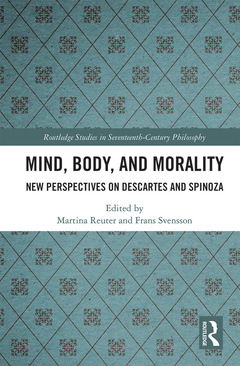Mind, Body, and Morality New Perspectives on Descartes and Spinoza Routledge Studies in Seventeenth-Century Philosophy Series
Coordonnateurs : Reuter Martina, Svensson Frans

The turn of the millennium has been marked by new developments in the study of early modern philosophy. In particular, the philosophy of René Descartes has been reinterpreted in a number of important and exciting ways, specifically concerning his work on the mind-body union, the connection between objective and formal reality, and his status as a moral philosopher. These fresh interpretations have coincided with a renewed interest in overlooked parts of the Cartesian corpus and a sustained focus on the similarities between Descartes? thought and the philosophy of Baruch Spinoza.
Mind, Body, and Moralityconsists of fifteen chapters written by scholars who have contributed significantly to the new turn in Descartes and Spinoza scholarship. The volume is divided into three parts. The first group of chapters examines different metaphysical and epistemological problems raised by the Cartesian mind-body union. Part II investigates Descartes? and Spinoza?s understanding of the relations between ideas, knowledge, and reality. Special emphasis is put on Spinoza?s conception of the relation between activity and passivity. Finally, the last part explores different aspects of Descartes? moral philosophy, connecting his views to important predecessors, Augustine and Abelard, and comparing them to Spinoza.
1. Introduction
Martina Reuter and Frans Svensson
Part I: Cartesian Persons
2. The Metaphysics of Cartesian Persons
Deborah Brown
3. The Gender of the Cartesian Mind, Body, and Mind-Body Union
Martina Reuter
4. "I certainly seem to see" – Embodiment in the Second Meditation
Mikko Yrjönsuuri
Part II: Ideas, Knowledge, and Reality
5. Ideas and Reality in Descartes
Peter Myrdal and Arto Repo
6. Spinoza’s Three Kinds of Cognition: Imagination, Understanding, and Definition and Essence
John Carriero
7. Mind-Body Interaction and Unity in Spinoza
Olli Koistinen
8. Spinoza and the Inferential Nature of Thought
Karolina Hübner
9. Self-Consciousness and Consciousness of Self: Spinoza on Desire and Pride
Lisa Shapiro
10. Spinoza on Activity and Passivity: The Problematic Definition Revisited
Valtteri Viljanen
Part III: Will, Virtue, and Love
11. Teleology and Descartes’ Problem of Error
Tomas Ekenberg
12. Descartes’ Generosité
Calvin Normore
13. A Cartesian Distinction in Virtue: Moral and Perfect
Frans Svensson
14. Spinoza and the Cartesian Definition of Love
Denis Kambouchner
15. Self and Will in Descartes’s Account of Love
Lilli Alanen
Martina Reuter is Senior Lecturer in the Department of Social Sciences and Philosophy at the University of Jyväskylä, Finland.
Frans Svensson is Senior Lecturer in the Department of Philosophy, Linguistics, and Theory of Science at the University of Gothenburg, Sweden.
Date de parution : 06-2021
15.2x22.9 cm
Date de parution : 03-2019
15.2x22.9 cm
Thème de Mind, Body, and Morality :
Mots-clés :
John Carriero; Marie Le Jars De Gournay; Martina Reuter; Lover’s Joy; Frans Svensson; Calvin Normore; Deborah Brown; Vice Versa; Mikko Yrjönsuuri; Karolina Hübner; Patient’s Nature; Lisa Shapiro; Mind Body Union; Valtteri Viljanen; God’s Essence; Peter Myrdal; Transeunt Causality; Arto Repo; Les Passions De; Olli Koistinen; Affirmative Essence; Tomas Ekenberg; Fourth Meditation; Doxastic Voluntarism; Spinoza’s Definition; Denis Kambouchner; Descartes’s Account; Lilli Alanen; Magnetic Force; René Descartes; Descartes’s Theory; Baruch Spinoza; Intellectual Love; mind-body union; Primitive Notion; personal identity; Liberum Arbitrium; François Poulain de la Barre; Perfect Virtue; non-embodied vision; Intellectual Emotions; Meditations; Spinoza’s Body; sensory perception; De Libero Arbitrio; Optics; the self; activity; passivity; self-consciousness; essence constitution; ideas; knowledge; reality; Leibniz; Cartesian cognition; res extensa; intuition; Augustine; Abelard; good; evil; morality; solid contentment; virtue; wisdom



